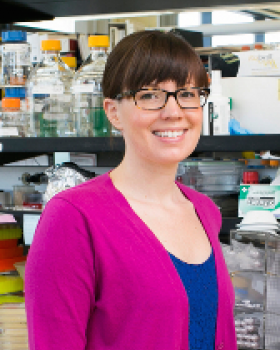Kim Seed, among others, chosen to conduct cutting-edge biomedical research - By Robert Sanders, Media relations
 Thirteen UC Berkeley faculty, seven of them women, are among 47 new investigators chosen by the Chan Zuckerberg Biohub to receive up to $1.5 million each over the next five years to conduct cutting-edge biomedical research — with no strings attached.
Thirteen UC Berkeley faculty, seven of them women, are among 47 new investigators chosen by the Chan Zuckerberg Biohub to receive up to $1.5 million each over the next five years to conduct cutting-edge biomedical research — with no strings attached.
The investigator awards are the first individual grants by the CZ Biohub as it seeks to foster unconventional scientific exploration and encourage researchers to invent new tools to accelerate the pace of discovery.
The CZ Biohub was established in September 2016 with $600 million over 10 years from Facebook founder and CEO Mark Zuckerberg and his wife, pediatrician Priscilla Chan, and operates as an independent nonprofit medical research organization collaborating with UC Berkeley, Stanford University and UC San Francisco to fund research. Its goal is to harness science, technology and human capacity to cure, prevent or manage all disease during our children’s lifetime.
Six of UC Berkeley’s new investigators are senior faculty. Each will receive $1.5 million over five years to pursue their research, with the freedom to change direction if they desire — an option not allowed by most research grants.
The seven other investigators are younger faculty, and will receive half the amount, $750,000 over five years, with a similar flexibility.
Kimberley Seed, an assistant professor of Plant and Microbial biology, carries out epidemiologic studies of the interactions between bacteriophages and Vibrio cholera, some strains of which cause cholera, in samples obtained from cholera outbreaks to enhance understanding of how these viruses shape the communities of these pathogens and affect infectivity. She will also determine how microclimates impact phage-host interactions.
Congratulations to Kim and her fellow researchers!
Read More
news.berkeley.edu/2017/02/08/cz-biohub-awards-nearly-14-5-million-to-berkeley-researchers
